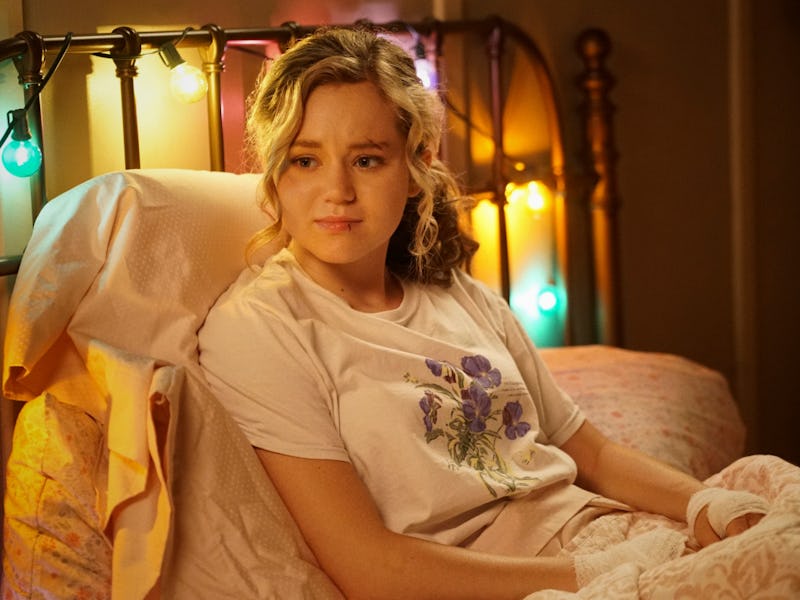Stargirl makes a played-out superhero trope feel new again
In "Shiv Part Two," Stargirl gets serious while poking fun at a classic superhero speech we've all heard before.

Seven years ago, a two minute YouTube video revealed how often movies use the "We're not so different, you and I" speech. It sampled only a handful of examples, but you know the trope: At a pivotal moment between a hero and a villain, the villain tells the hero that they're not so different, you and I.
The point is to remind the audience how well-written villains are often the heroes of their own story. They just have the unfortunate luck of being framed from the other side.
The speech is heard in everything from Raiders of the Lost Ark to Spider-Man, and memorably parodied in Austin Powers. But the latest episode of the DC superhero series Stargirl earnestly, and knowingly, uses this tired trope with a genuinely fun twist: It happens not in a supervillain's lair, not in a climactic battle, but in the room of a bedridden all-American girl, and delivered by a mean bully who knows the hero's heavily guarded secret.
You've seen a mean girl pick on the new girl. You've seen supervillains challenge a superhero. Stargirl asks: What's the difference?
Warning: Spoilers for Stargirl Episode 07, "Shiv Part Two" ahead.
Picking up the pieces from last week's incredible "Shiv Part One," Stargirl sees its title hero, Courtney (Brec Bassinger) recover from wounds sustained in her homecoming battle against Shiv, revealed to be Blue Valley High's resident queen, Cindy Burman (Meg DeLacy). Cindy's father, the Dragon King (Nelson Lee), is also unmasked as Dr. Ito, a war criminal from World War II and Starman's arch-nemesis.
As the rest of the Nu-JSA (not an official name, mind you) work to gather intel on Cindy, someone they learn lives a Stepford Wives-esque artificial home life, the villain pays a visit to a wounded Courtney. Showering her with balloons and candy, Cindy delivers that classic villain speech in between gobbles of cherry chocolate.
"You know what I realized from yesterday?" Cindy tells her, their homecoming battle still a recent memory. "We're not that different, you and me. In fact, we're kind of similar."
How? Courtney asks. Cindy, jousting, vaguely tells her: "Our dads. Stuff. I think if things were a little different, you'd be a lot more like me, actually." Cindy disarms Courtney, telling her she "needs a friend right now," but later pulls the rug out from underneath: Cindy knows Courtney is Stargirl.
In "Shiv Part Two," Beth (Anjelika Washington) and Pat (Luke Wilson) engage in sitcom shenanigans in the false home of a powerful supervillain.
At its core, Stargirl is about the burdens our fathers pass onto their children. Whether they knew it or not, Cindy and Courtney were fated to fight because their predecessors/fathers fought. Cindy's desire for a seat at the Injustice Society of America table is counter to Courtney's to rebuild the heroic JSA. If it weren't for their predetermined places on opposite sides of the tracks, maybe they could have been friends. Cindy is right, they are alike. They're stubborn, foolhardy, and driven to succeed with what they've inherited.
But it's because of who they are and what they want most that they'll never be on the same team (save for whatever twists the Stargirl writers may or may not have cooking for later).
At its current trajectory, Stargirl is on its way to rewriting the superhero playbook not by reinventing the wheel, but in its technically sound handling in the driver's seat. "Shiv Part Two" is riddled with both comic book superhero cliches and general TV ones too, yet it isn't weaker for doing any of it at all.
A fun distraction: When Beth (Anjelika Washington) and Pat (Luke Wilson) attempt to fool Cindy's mother, a character with eerie origins yet to be fully explained, Stargirl becomes a classic sitcom in a humorous conflict of false identities and keeping up of ruses. A million and one TV shows have done this exact scenario, but because of the sharply-defined characters in Stargirl, it never feels tired. Instead, it's exactly what Stargirl should be doing as it carefully moves forward to the finale.
As our current era of superhero television winds down, marked by the end of Arrow — the Batman Begins of TV — the genre is in the midst of transitioning into the next era as seen in aggressive, boundary-pushing shows like Harley Quinn and Doom Patrol. But Stargirl is an outlier. Due to its innate classical-ness, Stargirl feels like a relic of a bygone era. And yet, because of its youthful vigor, it also feels prescient of things yet to come.
Whatever superhero television looks like tomorrow, Stargirl is a colorful memento of what the genre once was and what it can still be. It's a show that confidently uses a cliche, adds a little zhoosh, and makes something fresh regardless of its familiarity.
Stargirl streams Sundays on DC Universe and Tuesdays at 8 p.m. on The CW.